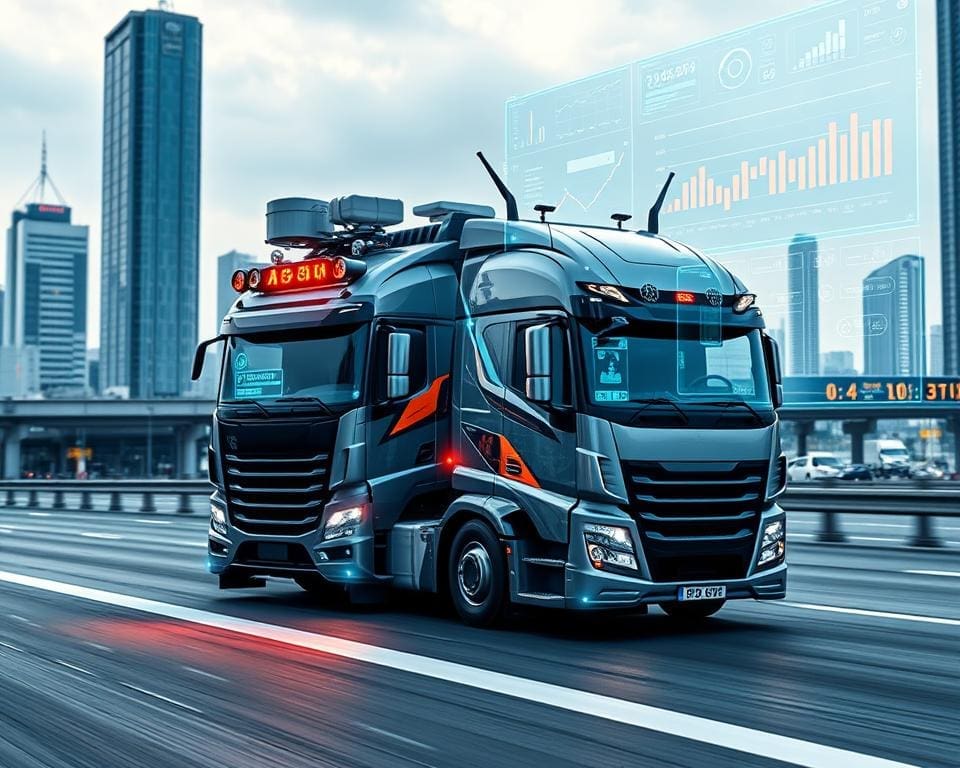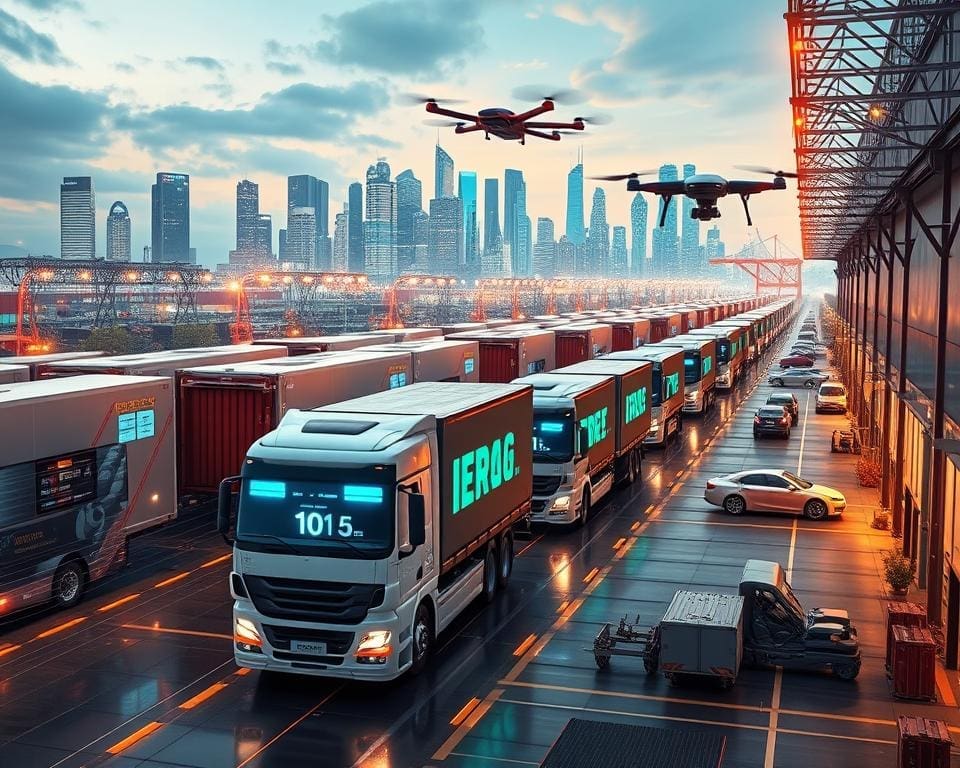In the dynamic landscape of modern commerce, the necessity for efficiency and adaptability in logistics has never been more paramount. Smart Trucking, a pivotal component of Logistics 4.0, leverages the transformative power of the Internet of Things (IoT) to create interconnected systems that revolutionise trucking operations. This shift towards connected truck technology enables real-time data exchange and analytics, empowering logistics companies to optimise their supply chains in ways that were previously inconceivable.
As businesses grapple with the demands of a rapidly evolving global marketplace, the integration of IoT into logistics processes becomes essential. The insights derived from industry leaders like Volvo, paired with research from experts such as McKinsey & Company, underscore the profound impact of IoT on supply chain innovation. Embracing these advancements not only enhances operational efficiency but also sets the stage for a more sustainable and responsive logistics environment.
Introduction to Smart Trucking and Logistics 4.0
The logistics industry has undergone a remarkable transformation over the years, leading to the emergence of Smart Trucking and Logistics 4.0. This evolution of logistics technology combines digital advancements and innovative practices that enhance operational efficiencies in supply chains globally.
The Evolution of Logistics Technology
Historically, logistics relied on manual processes that often resulted in inefficiencies. The evolution of logistics technology has introduced automation, optimising these operations. Advancements such as cloud computing and big data analytics have enabled more sophisticated management of logistics resources. Furthermore, blockchain technology has provided a framework for enhanced security and transparency.
Impact of IoT on Supply Chain Innovation
The IoT in the trucking industry represents a pivotal element in modern logistics. By connecting vehicles, equipment, and systems, it facilitates real-time data sharing, significantly improving transparency and responsiveness. This interconnectedness leads to remarkable enhancements in supply chain innovation, enabling companies to proactively address challenges and streamline operations. Businesses leverage these advancements for predictive analytics, optimising routes, and monitoring vehicle conditions, proving that embracing logistics technology trends is essential for future success.

Smart Trucking: How IoT Powers Logistics 4.0
The integration of the Internet of Things (IoT) into the trucking industry signifies a monumental shift towards intelligent, efficient logistics practices. With a network of interconnected devices, IoT solutions enable the gathering and sharing of data, revolutionising how goods are transported and managed. This transformation invites an examination of the critical components that define IoT in the trucking industry.
Defining IoT in the Trucking Industry
In essence, IoT in the trucking industry comprises a range of technologies including sensors, GPS devices, and data communication systems. These components work synergistically to foster enhanced operational oversight and fleet management. Fleet managers can utilise real-time data to improve decision-making processes regarding route optimisation and vehicle maintenance. This leads to significant advancements in logistical efficiency, thereby supporting the broader initiative of smart logistics solutions.
Key IoT Applications in Logistics
Numerous IoT applications in logistics demonstrate how technology can streamline operations and drive productivity. Prominent examples include:
- Telematics: This application leverages GPS tracking and onboard diagnostics to provide invaluable insights into vehicle performance and location.
- Predictive Maintenance: IoT tools help anticipate mechanical failures before they occur, facilitating proactive repairs and minimising downtime.
- Automated Reporting: Real-time data collection simplifies reporting processes, allowing for accelerated decision-making and improved operational transparency.
The potential benefits of these innovations cannot be overstated. By embracing IoT applications in logistics, companies can expect reduced operational costs, improved fleet efficiency, and a more agile response to changing market demands.
Connected Truck Technology and Its Benefits
Connected truck technology represents a significant advancement in the logistics industry, promising to transform operations through real-time data exchange and smart applications. Such innovations are pivotal in enhancing efficiency and optimising overall performance within the supply chain.
Enhancing Efficiency and Reducing Costs
The adoption of technologies such as vehicle-to-vehicle (V2V) and vehicle-to-infrastructure (V2I) communication plays a crucial role in modernising fleet management. These systems allow trucks to communicate with one another and the surrounding infrastructure, improving safety and operational efficiency. Benefits include:
- Fuel management: Real-time data enables better route planning and fuel consumption, leading to notable cost reductions.
- Driver assistance: Enhanced safety features, including collision warnings and lane-keeping assist, significantly reduce the risk of accidents.
- Predictive maintenance: Continuous monitoring of vehicle performance allows for timely service, minimising downtime.
Case Studies of Success in Smart Transportation Systems
Several industry leaders have successfully integrated connected truck technology into their operations, yielding impressive results. For instance, UPS has leveraged these systems to optimise delivery routes, resulting in reduced fuel expenditures and improved service reliability. Similarly, Daimler has seen enhanced fleet performance through advanced connectivity solutions, showcasing the tangible benefits of smart transportation systems.
Research conducted by Deloitte indicates that companies embracing connected trucking solutions can achieve substantial operational improvements and cost savings. The American Transportation Research Institute further underscores the effectiveness of these technologies in creating a safer and more efficient logistics environment.
Logistics Technology Trends Shaping the Future
The logistics industry stands on the brink of transformation powered by a variety of emerging technologies. As companies strive to implement smart logistics solutions, understanding the logistics technology trends becoming prevalent in the sector is crucial. Key innovations such as artificial intelligence, blockchain technology, and autonomous vehicles offer unprecedented opportunities for efficiency and optimisation.
Emerging Technologies in Smart Logistics Solutions
Artificial intelligence and machine learning are leading the way in revolutionising logistics operations. These technologies enable predictive analytics that improve decision-making processes and streamline supply chain management. The rise of automation impacts warehouse management, enhancing productivity while decreasing human error. Autonomous vehicles signify a shift towards safer and more efficient transportation methods. By embracing these innovations, companies can drive substantial improvements in their logistics systems.
The Role of Digital Transformation in Logistics
Digital transformation in logistics plays an integral role in ensuring that businesses stay competitive. This transition helps companies to merge traditional practices with cutting-edge technology seamlessly. Integration of Internet of Things (IoT) devices enhances real-time tracking and monitoring of shipments, providing better visibility across the supply chain. Industry predictions emphasise that organisations adopting digital solutions will outperform their peers significantly, showcasing the essential nature of these logistics technology trends.
Challenges and Opportunities in IoT Adoption
The journey towards implementing IoT in smart trucking and logistics is ripe with both challenges and opportunities in IoT. Companies often find themselves facing significant hurdles such as cybersecurity risks, which can lead to data breaches and compromise sensitive information. Additionally, interoperability concerns arise when integrating new technologies with existing systems, making it difficult for businesses to achieve seamless operations. High initial investment costs can also deter many organisations from taking the leap into the world of IoT, impacting the overall adoption rate within the industry.
However, overcoming these challenges presents a multitude of opportunities for those ready to embrace smart logistics solutions. By effectively adopting IoT technologies, companies can gain a competitive edge in the market, elevating customer satisfaction through improved transparency and operational efficiency. Furthermore, the potential for achieving sustainability goals cannot be overlooked; enhanced tracking of vehicle emissions and resource use can significantly reduce a company’s carbon footprint, aligning with global environmental objectives.
Insights from industry experts, alongside practical frameworks from successful adopters, offer invaluable guidance for navigating the complexities associated with IoT in logistics. Reports from the Institute of Electrical and Electronics Engineers (IEEE) and the World Economic Forum provide evidence of tangible benefits realised by companies that have successfully tackled the challenges in IoT adoption. Embracing this technological evolution not only fosters growth but also paves the way for a more resilient and responsive logistics landscape.









